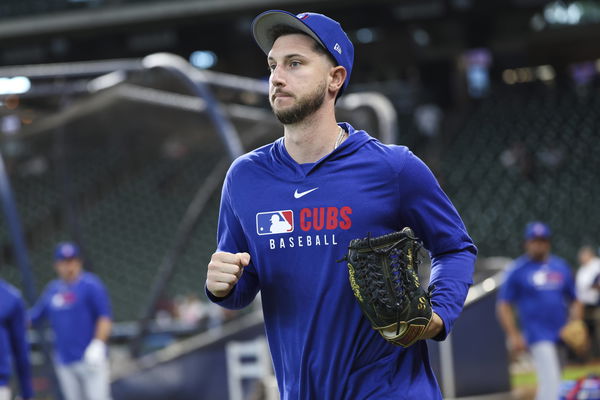
via Imago
MLB, Baseball Herren, USA Chicago Cubs at Houston Astros Jun 28, 2025 Houston, Texas, USA Chicago Cubs right fielder Kyle Tucker 30 jogs onto the field before the game against the Houston Astros at Daikin Park. Houston Daikin Park Texas USA, EDITORIAL USE ONLY PUBLICATIONxINxGERxSUIxAUTxONLY Copyright: xTroyxTaorminax 20250628_tjt_at5_0015

via Imago
MLB, Baseball Herren, USA Chicago Cubs at Houston Astros Jun 28, 2025 Houston, Texas, USA Chicago Cubs right fielder Kyle Tucker 30 jogs onto the field before the game against the Houston Astros at Daikin Park. Houston Daikin Park Texas USA, EDITORIAL USE ONLY PUBLICATIONxINxGERxSUIxAUTxONLY Copyright: xTroyxTaorminax 20250628_tjt_at5_0015
The Chicago Cubs were interested in elite pitchers like MacKenzie Gore, Edward Cabrera, Sandy Alcantara, and Joe Ryan as the trade deadline approached. But when the deadline was finally up, none of these guys signed with the Cubs. Was it a matter of performance? No! It was a well-calculated move from the front office.
BTS, the front office was thinking about the future and the changes that MLB might bring next. Like, what will happen when the present CBA runs out? How can players secure long-term financial support amid evolving baseball economics? Yes, the trade decision might have been affected by the whispers of the salary cap and lockout that are swirling around in MLB.
Recently, the North Side Baseball shed light on this matter. A source told the outlet that neither the possibility of a lockout nor the uncertainty about the game’s financial future after 2027 was directly discussed. They could only guess why the Cubs were willing to give up more seasons than the team that was going to sell them. Still, it seemed like the two teams were looking at the length of team control as an issue in different ways. The source also highlighted the Cubs’ internal negotiations that the “uncertainty about the system” beyond 2027 was a factor.
ADVERTISEMENT
Article continues below this ad
That system uncertainty might be tied to growing talk of a salary cap. Team owners want spending limits in the next CBA. But players oppose it, fearing it could harm open-market revenues that allow for large contracts. For the Cubs, planning three to four years ahead, trading top prospects for players with long-term deals could be a risky move if a salary cap is introduced.

via Imago
credits: MLB.COM
Kyle Tucker’s contract situation adds another layer of complexity. His possible extension might be worth up to $400 million. So the Cubs need to keep their finances as flexible as possible. And in an interview with ESPN after the deadline, Cubs executive Carter Hawkins said, “We have a responsibility to the 2025 Cubs but also the 2032 Cubs. That’s not always popular in the moment, but it’s decisions we have to make.” Well, it sums it all up. The front office adopted a futuristic approach. But can that approach cost them this season?
ADVERTISEMENT
Article continues below this ad
Protecting the future at the expense of 2025?
The Cubs began the 2025 season with high expectations, but faced unexpected challenges such as injuries and inconsistent player performance. And the trade deadline strategy might have made it worse for them.
They lost to the Reds 5–1 on August 5, highlighting pitching struggles. Shota Imanaga, the starter, got the first nine hitters out. But he was taken out after four innings. Andrew Kittredge, a reliever, gave up four runs in only one-third of an inning. He gave up four hits and didn’t get a strikeout. The Cubs lost because their bullpen couldn’t stop Cincinnati’s offense.
ADVERTISEMENT
Article continues below this ad
What’s your perspective on:
Did the Cubs' future-focused strategy sacrifice their 2025 season's success? What's your take on this gamble?
Have an interesting take?
On August 8 against the Cardinals, Matthew Boyd, the starting pitcher, gave up three runs on seven hits in five innings. He struck out three batters. But he couldn’t stop the Cardinals from taking advantage of scoring chances, which led to the Cubs’ 5–0 shutout loss. In their last game, they lost to the Toronto Blue Jays 5–1. Starting pitcher Javier Assad gave up four runs in four innings. This loss highlighted the pitching woes even more clearly.
Top Stories
The Cubs have made changes to their roster by acquiring pitchers Taylor Rogers and Andrew Kittredge, along with utility player Willi Castro. They also placed Ryan Pressly on assignment and moved Miguel Amaya to the 60-day IL. These moves aim to strengthen the bullpen and enhance the lineup. The Cubs are at a critical point. While their cautious strategy may secure long-term financial stability. It could hinder this season. As the playoff race intensifies, the clubhouse needs to find a balance.
ADVERTISEMENT
ADVERTISEMENT
ADVERTISEMENT
ADVERTISEMENT



Did the Cubs' future-focused strategy sacrifice their 2025 season's success? What's your take on this gamble?